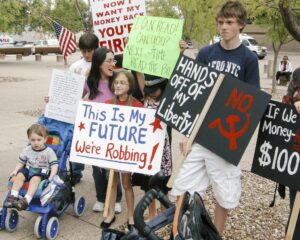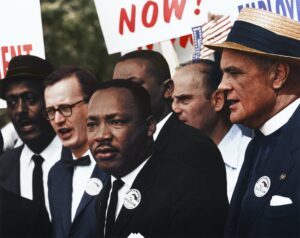Talk about holding a grudge. Right-wing evangelicals and corporate capitalists are still outraged by the National Labor Relations Act of 1935, the New Deal policy that established the National Labor Relations Board (NLRB) to both give teeth to federal labor laws that govern collective bargaining and to craft laws to rectify unfair labor practices. According to labor historian Jane McAlevey, the Act “created the legal architecture that legitimated unions, transforming them from organizations the employers could ignore without penalty into legally binding mechanisms that could practice collective [rather than individual] bargaining.”
Yet most right-wing evangelicals did not welcome the labor supporting mandate of the NLRB. Typical of their responses is the shrill 1940 charge the Church League of America trumpeted to its 100,000 members that the National Labor Relations Act “tied the hands of every employer (large or small) so that any criminal … could go into any plant and start organizing the employes [sic] into a dues-paying corral regardless of the merits of the case.” This was merely an early volley in the ongoing war waged against America’s labor unions, the only bulwark that the working folk of America has against the depredations of big business, by the unholy alliance between big business and right-wing evangelicals.
Like so many of the rancid claims of today’s right-wing evangelicals this, too, is a radical departure from the more humane and socially enlightened historical roots of American evangelical Christianity. For generally, eighteenth and nineteenth-century evangelicals differed greatly from the right-wing evangelicals that bedevil today’s political terrain in this crucial respect: earlier evangelicals actually honored the concern for the plight of workers that pervades the Bible, from the deliverance of the Hebrew laborers from inhumane demands in the book of Exodus and beyond. Indeed, clear-eyed readers of the Bible know that there are a multitude of passages that specifically inveigh against the exploitation of the laboring poor by the rich and the powerful.
For instance, Deuteronomy 24:14-15, one of the earliest biblical labor prescriptions, commands “you shall not withhold the wages of poor and needy laborers.” The prophet Jeremiah proclaimed with righteous outrage, “Woe to him who builds his house by unrighteousness, and his upper rooms by injustice; who makes his neighbors work for nothing and does not give them their wages” (Jer. 22:13). Jesus, himself a tekton (“carpenter” or “manual laborer,” as he is described in Matthew 13:55 and Mark 6:3), spoke specifically to the struggles of workers. He said of his disciples, and by extension all who labor, “The laborer deserves to be paid” (Luke 10:7). In Matthew 11:29-30, Jesus expressed his concern for the back-breaking struggles for subsistence wages by his overwhelmingly working poor audience (“Come to me, all who are weary and carrying heavy burdens, and I will give you rest”).
Matthew 20:1-16 recounts a widely misunderstood parable of Jesus in which standing crowds of landless workers are so desperate for a day’s pay that they literally jump at an offer to work in the expansive vineyards of a “householder” for a denarius a day, a non-living wage that could barely feed one person, much less an entire family. In this parable, another group of workers desperately rushes to do his bidding without even asking what their wage will be. When one laborer protests at the end of the day that he has not been fairly remunerated for the amount of work he has done, the vineyard owner singles him out as if to make an example of him, dismissing him as “evil” for daring to look out for his own interests (verse 15 literally reads “is your eye evil because I am good?”) which can easily be construed as highlighting the need for worker solidarity. That the parable intends to foreground the sorry plight of workers becomes obvious when it is stripped of the theological overlay offered by traditional teachings that ignore the high-handed, exploitive actions of the “householder” (oikodespotes, literally “house master” or “house despot”) and instead construe him as God, who is simply exercising a capricious divine prerequisite to bless whomever and however God chooses.
Even more pointed is the New Testament Letter of James, believed to be written by the brother of Jesus, which decries the oppression of workers in unambiguously scathing fashion: “Behold, the wages of the laborers who mowed your fields, which you kept back by fraud, cry out; and the cries of the harvesters have reached the ears of the Lord of hosts” (James 5:4).
Consistent with this pervasive biblical witness, many early evangelicals embraced the struggle against the exploitation of workers as an important component of biblical faith and responsibility, a crucial expression of “love your neighbor as yourself.” For example, the plight of labor was a major issue at the 1873 Sixth General Conference of the Evangelical Alliance. Citing Mark 2:27 (“The Sabbath was made for man, not man for the Sabbath”) Reverend Mark Hopkins, a former president of Williams College, called for laws to protect the Christian Sabbath because, in addition to religious considerations, it provides workers a much-needed day of rest often denied them by callous employers — an important part of the Sabbath’s original intent. In that same conference, William G. Allen, president of Girard College in Philadelphia, called upon the federal government to enact several crucial progressive measures in support of workers, including the eight-hour workday, fair apprenticeship laws, allocation of public lands for those who would settle them (presumably working men and women to the exclusion of speculators and railroad companies), and settling labor disputes through mandatory arbitration — in 1873! Allen even called for the establishment of a bureau of labor statistics to document the status of workers and give statistical heft to their claims for parity.
Of course, not only ancient workers were sorely abused and exploited. At the outset of the Industrial Age in late eighteenth and early nineteenth-century England, dispossessed landless workers were subjected to even greater abuses. In order to make enough to survive, vast numbers were forced to labor sixteen hours or more per day in the dirty, dangerous conditions of factories and mines — “dark satanic mills,” as the poet John Milton famously called them. Children as young as six years old worked ten-hour days, with boys of ten and twelve laboring as much as fourteen hours daily for the equivalent of fifty or sixty cents. In his 1906 expose, The Bitter Cry of the Children, the British union organizer John Spargo described the plight of children compelled to labor in coal mines:
From the cramped position they have to assume, most of them become more or less deformed and bent-backed like old men …. Accidents to the hands, such as cut, broken or crushed fingers, are common among the boys. Sometimes there is a worse accident: a terrified shriek is heard, and a boy is mangled and torn in the machinery, and disappears in the chute to be picked out later smothered and dead.
It was to protect workers from such inhumane abuses of their safety and dignity that unions and workers’ guilds arose in nineteenth-century America. Early union activists and advocates for economic democracy courageously struggled against the entrenched forces of capital to win wages sufficient for adequate food and shelter for those forced to labor for others. Evangelicals played an important role in this movement. One example is the early union organizer, Scottish immigrant Andrew Cameron (1834-1890). A devout, Bible-quoting evangelical who considered union organizing a Gospel mandate, Cameron helped to found the National Labor Union in 1866. It was said that Cameron, a tireless crusader for an eight-hour workday, “never missed a chance to point out that Jesus had been a workingman.” The conviction that union activism is a Gospel mandate was so deeply held by the church family of James W. Kline, president of the International Brotherhood of Blacksmiths, that while he was in the midst of extended strike negotiations in 1911 his church sent him a telegram that read in part, “God bless you in your efforts to do that for which the Master came.”
But the owners of capital, who with good reason were widely characterized as “robber barons,” were heedless of the message of the faith that most of them piously proclaimed. If they appealed to biblical faith at all, they used passages like Ecclesiastes 5:18 to justify onerous, at times horrific working conditions: “it is appropriate for a person to eat, to drink and to find satisfaction in their toilsome labor under the sun during the few days of life God has given them—for this is their lot.” Their self-serving implication is clear: that workers should be satisfied with what employers allot to them and not ask for more, as if their employers were the direct representatives of God.
In 1949 the unholy alliance between right-wing evangelicalism and the anti-union efforts of big business received a major shot in the arm. In September of that year, Reverend Billy Graham burst upon the scene at a massive tent revival in Los Angeles. By the time the revival ended two months later, some 350,000 people had attended the services. Yet for all his months of preaching a Gospel of love, he showed relatively little love for the plight of workers forced to band together to protect themselves against corporate depredations. Instead, Graham scathingly likened unions and their leaders to serpents and pestilence. The Garden of Eden, he said, was a paradise with “no union dues, no labor leaders, no snakes, no disease.” He condemned labor leaders as dangerous godless “Communists” charging, without examples or evidence, that they “would like to outlaw religion, disregard God, the church, and the Bible.” Yet, Graham never questioned the piety of the business executives who opposed workers’ struggles for fair treatment, nor the unrighteousness of management’s quest to maximize profits without the least concern for the wellbeing of the workers whose labor enriched them.
The work strike is one of the few effective tools that workers have to press for their interests in the face of immense corporate power and wealth. Yet corporate leaders and their right-wing evangelical cohorts have regularly denounced workers’ strikes in the most sordid terms. Graham was unreserved in his denunciation of strikes, insisting that a true Christian “would not stoop to taking unfair advantage” of an employer with a union strike. Herbert J. Taylor (1893-1978), a right-wing evangelical Christian and an inductee into the American National Business Hall of Fame, portrayed worker strikes as being fueled by patently ignoble instincts. “Most strikes and lockouts,” he declared, “can be traced directly to selfishness, insincerity, unfair dealings, or fear and lack of friendship among the men concerned.” Yet one is hard-pressed to find an instance of any prominent business figure describing a corporate manager in similarly derisive terms, no matter how greedy, callous, tight-fisted or manifestly unjust their actions are shown to be. Indeed, right-wing evangelical attacks on workers’ strikes are usually self-serving libertarian arguments disguised as theology. A telling example appears on a popular right-wing evangelical website:
“If the employee — often through unions — forces the employer to pay more in wages and/or benefits than he is willing to, then that is oppression by extortion… if the union uses tactics to try and force an employer to give more than he is willing to give then we have a sinful, unBiblical, oppressive situation. No Christian should support such activity which is actually criminal extortion… This means that strikes are totally wrong. No Christians should ever vote for a strike for any reason.”
Despite their veneer of religiosity, assertions like these rest upon a fallacious and morally corrupt assumption that flies directly in the face of decency: that employers own the moral high ground simply because they are employers, and that they will always act justly and morally responsibly toward workers and, thus, workers have no right to question their decisions or insist that they be paid a living wage or treated with dignity.
One of the more striking examples of the unholy marriage between right-wing evangelicals and big business is found in a 1990 Christian Coalition Leadership Manual. The Manual states that “God established His pattern for work,” which it explains using four Bible passages instructing slaves to be obedient to their masters as a model for modern employer-employee relations, including this passage from 1 Peter: “Slaves, submit yourselves to your masters with all respect, not only to those who are good and considerate but also to those who are harsh. For it is commendable if a man bears up under the pain of unjust suffering because he is conscious of God (2:18-19). “
The Manual explains with no sense of irony, “Of course, slavery was abolished in this country many years ago, so we must apply these principles to the way Americans work today, to employees and employers.” Then it draws a conclusion that could have been written in feudal times: “Christians have a responsibility to submit to the authority of their employers, since they are designated as part of God’s plan for the exercise of authority on the earth by man.”
Not to be forgotten is right-wing evangelicals’ support for President Ronald Reagan’s destruction of the Professional Air Traffic Controllers Organization (PATCO) union, which emboldened and legitimated a widespread ongoing corporate assault on unions that saw union membership in the United States drop from nearly 25 percent of all workers in 1980 to about 6 percent today. Right-wing evangelicals unwavering support of the patently anti-labor Trump administration empowered him and his minions to step up the onslaught against labor by scrapping numerous job safety regulations and killing a ruling that extended overtime pay to millions of workers. But worse is what the right-wing evangelicals’ hero Donald Trump has done to Franklin Roosevelt’s National Labor Relations Board.
Since Roosevelt established the NLRB in 1937, wages and labor conditions in America have greatly improved. For three-quarters of a century, the NLRB has diligently sought to guard workers’ rights against constant attempts by corporate managers to erode and forestall them. But undergirded by the unrelenting support of influential right-wing evangelical leaders like Dallas mega-church pastor Robert Jeffress and Tony Perkins of the right-wing Family Research Council, the Trump Administration actually weaponized the NLRB not only to not protect the interests of workers but instead to actually dismantle rulings that protect workers’ hard-earned rights. Labor attorney Lynn Rhinehart lamented, “In decision after decision, the [Trump] NLRB has stripped workers of their protections under the law, restricted their ability to organize at their workplace, slowed down the union election process to give employers more time to campaign against the union, repealed rules holding employers accountable for their actions, and undermined workers’ bargaining rights.” A telling example: incredibly, Trump’s NLRB ruled that a worker may be disciplined for simply mentioning forming a union or for merely referencing an organizing effort to a fellow worker during the workday. Not only are such rulings outrageously oppressive; they also fly squarely in the face of biblical justice and decency.
It is true that right-wing evangelicals are not directly responsible for the passing of anti-labor laws and policies, but their extravagant financial and political support of anti-union politicians like Republican ex-Wisconsin governor, Scott Walker, and organizations like the Mackinac Center for Public Policy and the American Legislative Exchange Council (ALEC), has played a major role in their successful adoption. As a consequence, the masses of American workers, ironically including perhaps the bulk of their evangelical followers, endure some of the most unfair working arrangements in the industrial world. For instance:
-
- America is the only industrial nation in which workers have no legal right to a vacation, paid or unpaid.
- For those fortunate enough to be granted a vacation, the norm is a mere two weeks, while in countries with stronger union traditions, like Germany, Britain and France, four to six weeks of paid leave is the norm.
- American workers have fewer labor rights and average more working days per year than the Japanese, two and a half weeks more than British and French workers, and on average labor a whopping ten and a half weeks more than German workers.
- Adjusted for inflation, the US federal minimum hourly wage of $7.25 is actually thirty-seven percent below its buying power in 1968 – more than a half-century ago! If it had merely kept pace with inflation with no increases the minimum wage would only be about $10.00, still nowhere near a living wage in any region of this nation.
Right-wing evangelicals continue to play a huge role in the perpetuation of the vast chasm between the rich and the poor by their fallacious conflation of Christianity with selfish libertarianism and their cult-like support for a Republican Party, which unflinchingly privileges corporate profits and the interests of the wealthy over the welfare of the masses whose labor generates their immense wealth. By any measure of civility, decency and justice, the cheek-by-jowl alliance of right-wing evangelicals with corporate capitalists and their efforts to destroy unions so they can even more rapaciously bleed the laboring classes is a shameful, unholy alliance. It is past time for their reprehensible complicity in the ongoing exploitation and abuse of America’s working classes to be brought into the light of labor’s righteous struggle for the equal access of all to the fruits of their own labor and economic endeavor.
Adapted from Christians Against Christianity: How Right-Wing Evangelicals Are Destroying Our Nation and Our Faith (Beacon, 2021)
Obery M. Henrdicks, Jr. was president of Payne Theological Seminary, teaches religion at Columbia University and Yale Divinity School, and is professor emeritus at New York Theological Seminary. He is the author of the widely acclaimed The Politics of Jesus: Rediscovering the True Revolutionary Nature of Jesus’ Teachings and How They Have Been Corrupted (Doubleday: 2006).




